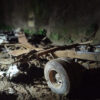India-Pakistan Conflict Escalates with Cross-Border Missile and Drone Strikes
Tensions between India and Pakistan have escalated sharply following a series of missile and drone attacks that have led to retaliatory strikes, the closure of airspace, and intense military engagements across the border. The overnight exchange of fire marks one of the most significant escalations in recent years between the two nuclear-armed neighbours.
In response to a wave of long-range missile and drone attacks launched by Pakistan targeting 26 locations — from Jammu and Kashmir to Gujarat — Indian armed forces carried out retaliatory strikes late Friday night. According to defence ministry sources, India successfully thwarted all Pakistani attempts to strike key installations, including airports and air bases, with its superior air defence systems.
Pakistan fired a long-range missile at a strategic Indian location, which was intercepted and destroyed by India’s Air Defence Systems (ADS) in the Western Sector. The Ministry of External Affairs is expected to provide a detailed battle assessment later today.
India’s retaliation included precise strikes on four major Pakistani airbases — Noor Khan (Rawalpindi), Murid (Chakwal), and Rafiqui (Shorkot) — inflicting considerable damage on military infrastructure and assets, according to government sources. Simultaneously, Indian forces targeted terror launchpads in Pakistan-occupied Kashmir’s Neelam Valley and Sialkot region, believed to be launching points for drone attacks into Indian territory.
Amid the heightened conflict, Pakistan has shut down its airspace until 12 noon today. Sources reported that PIA218, a Pakistan International Airlines flight bound for Peshawar, was forced to hover over Quetta before being grounded. Explosions were reported in Islamabad, Lahore, and other major Pakistani cities, further stoking fears of a prolonged military confrontation.
The Airports Authority of India (AAI), in coordination with other aviation regulators, has suspended civil flight operations at 32 airports in northern and western India from May 9 to 14. The latest additions to the closure list include Adampur, Ambala, Awanthipur, Naliya, and Uttarlai.
On the ground, intense shelling and artillery fire have been reported across the Line of Control. Heavy engagement is underway over Srinagar and adjoining areas, with Indian forces activating surface-to-air missile systems in anticipation of further aerial threats. Shelling began in Naushera around 5 a.m., and loud explosions continue to be heard.
In a tragic development, Additional District Development Commissioner of Rajouri, Raj Kumar Thappa, was killed after a Pakistani shell struck his residence. Jammu and Kashmir Chief Minister Omar Abdullah expressed profound grief, describing Thappa’s death as “devastating,” noting that the officer had participated in a virtual meeting with him just a day earlier.
India’s air defence systems — including the S-400 Triumf, Akashteer, L-70, Zu-23, and Schilka — remain on high alert, successfully neutralizing repeated Pakistani drone intrusions. Army sources confirmed the destruction of several Pakistani posts and terrorist launch pads near the Jammu region, used to launch tube-launched drones across the border.
This latest escalation follows Indian precision strikes earlier in the week targeting terror infrastructure in Pakistan and PoK, which were in response to the April 22 terrorist attack in Pahalgam that killed 26 people, mostly tourists.
With both sides on high alert and military operations continuing, the situation remains volatile and is being closely monitored by international observers.



































